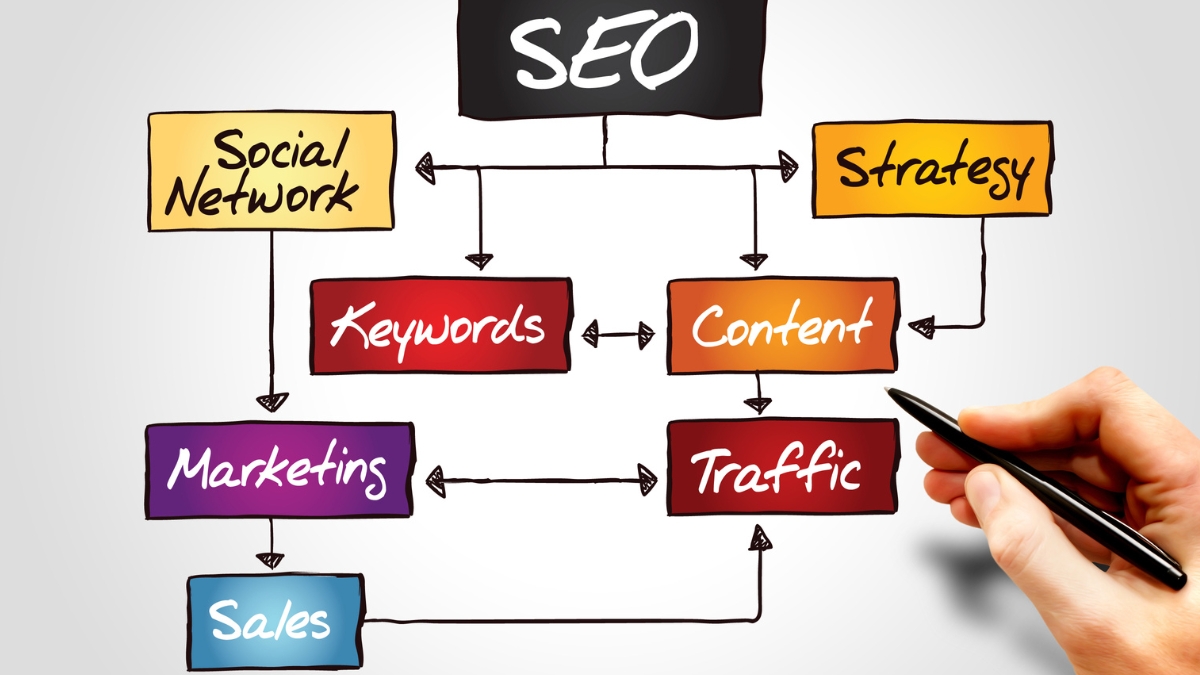
Top Strategies for Making Money with SEO (Search Engine Optimization)
In today’s digital age, SEO (Search Engine Optimization) is more than just a buzzword—it’s a crucial component of any successful online strategy. By harnessing the power of SEO, businesses and individuals alike can significantly boost their revenue. Whether you’re an entrepreneur, a marketer, or a content creator, mastering SEO can open doors to a multitude of monetization opportunities. In this comprehensive guide, we’ll delve into the top strategies for making money with SEO, equipping you with actionable insights to turn search engine traffic into revenue.
Keyword Research and Targeting
Keyword research is the cornerstone of effective SEO. By understanding what terms and phrases your target audience is searching for, you can tailor your content to meet their needs and drive targeted traffic to your site. Here’s how to make the most out of keyword research:
- Tools and Techniques: Utilize keyword research tools like Google Keyword Planner, SEMrush, Ahrefs, and Ubersuggest to find high-volume, low-competition keywords. These tools provide insights into search volume, keyword difficulty, and related terms.
- Long-Tail Keywords: While high-volume keywords are attractive, they’re often highly competitive. Long-tail keywords—phrases with three or more words—tend to have lower competition and higher conversion rates. For example, instead of targeting “shoes,” focus on “best running shoes for women with flat feet.”
- Monetization Tip: By targeting the right keywords, you can attract visitors who are more likely to convert. This can lead to increased sales, higher ad revenue, or greater affiliate commissions. For instance, if you run an e-commerce site, optimizing for specific product-related keywords can drive more qualified leads to your product pages.
Want to get paid for your writing? PaidOnlineWritingJobs.com helps you find real, flexible writing gigs that you can do from home—no experience needed. From blog posts to social media content, you’ll discover a wide range of opportunities suited to your skills and interests. Start today at PaidOnlineWritingJobs.com and turn your passion for writing into income!
👉 Click here to join and start earning: CLICK HERE!

Content Creation and Optimization
Content is king in the world of SEO. High-quality, engaging content not only attracts visitors but also keeps them on your site longer, improving your search engine rankings. Here’s how to create and optimize content that generates revenue:
- High-Quality Content: Your content should provide real value to your audience. This means addressing their pain points, answering their questions, and offering solutions. Well-researched articles, comprehensive guides, and engaging multimedia content are all effective.
- On-Page SEO: Optimize your content for search engines by incorporating your target keywords naturally into title tags, meta descriptions, headers, and throughout the body of the text. Use internal linking to guide visitors to related content on your site, and ensure your content is easily readable with proper formatting.
- Content Types: Diversify your content to cater to different audience preferences. Blog posts, infographics, videos, and podcasts can all drive traffic and engage users in unique ways. For instance, a well-produced video tutorial on your product can significantly boost conversions.
- Monetization Tip: Optimized content can lead to better visibility in search engines, driving more organic traffic to your site. This increased traffic can translate into higher ad revenue, more affiliate sales, or more customers for your products or services.

Building and Managing Backlinks
Backlinks—links from other websites to your own—are a critical factor in SEO. They signal to search engines that your content is authoritative and trustworthy. Here’s how to build and manage backlinks effectively:
- Importance of Backlinks: Backlinks are a major ranking factor for search engines. Quality backlinks from reputable sites can boost your search engine rankings, driving more traffic to your site.
- Strategies for Acquiring Backlinks: Reach out to industry influencers for guest blogging opportunities, create shareable content that naturally earns links, and engage in backlink outreach by contacting website owners for link placements. Additionally, submitting your site to relevant directories can also help.
- Monitoring and Maintaining: Use tools like Ahrefs, Moz, or Google Search Console to monitor your backlink profile. Regularly audit your backlinks to ensure they are high-quality and remove any toxic links that could harm your SEO.
- Monetization Tip: Strong backlinks can enhance your site’s authority and visibility, leading to increased organic traffic. More traffic means more potential revenue from ads, affiliate marketing, or product sales.

Technical SEO
Technical SEO focuses on optimizing the technical aspects of your website to improve its performance and user experience. Here’s what you need to know:
- Site Performance: Site speed and mobile-friendliness are crucial for both user experience and SEO. A fast-loading, mobile-optimized site can improve rankings and reduce bounce rates. Tools like Google PageSpeed Insights can help you identify and fix performance issues.
- Technical Elements: Ensure your site is crawlable and indexable by search engines. Use a clean URL structure, create an XML sitemap, and utilize structured data to help search engines understand your content. Regularly check for and fix any crawl errors or broken links.
- Tools and Fixes: Implement technical SEO tools like Screaming Frog or Sitebulb to conduct comprehensive site audits. These tools can identify issues such as duplicate content, missing meta tags, or broken links that need to be addressed.
- Monetization Tip: A well-optimized technical foundation improves user experience and search engine rankings, leading to higher traffic and better conversion rates. This, in turn, can enhance revenue from various monetization channels.

Local SEO
For businesses targeting specific geographic areas, local SEO is essential. It helps you connect with potential customers in your area and drive more local traffic to your site.
- Local Search Importance: Local SEO helps your business appear in local search results, such as Google Maps and local business listings. This is particularly important for brick-and-mortar stores and service providers.
- Optimization Techniques: Claim and optimize your Google My Business listing, ensuring all information is accurate and up-to-date. Build local citations by listing your business in local directories, and encourage satisfied customers to leave positive reviews.
- Local Content: Create content that resonates with local interests and addresses local issues. For instance, a restaurant might publish blog posts about local food events or community happenings.
- Monetization Tip: Effective local SEO can drive more foot traffic to your physical store or generate local leads for your services. This can result in increased sales and revenue from your local customer base.

SEO Analytics and Tracking
To make informed decisions and optimize your SEO efforts, you need to track and analyze your performance. Here’s how to effectively use SEO analytics:
- Importance of Analytics: SEO analytics help you understand how your strategies are performing and where improvements can be made. By analyzing key metrics, you can refine your approach to maximize results.
- Key Metrics to Monitor: Track metrics such as organic traffic, keyword rankings, conversion rates, bounce rates, and page load times. These metrics provide insights into how well your site is performing and how users are interacting with your content.
- Tools for Tracking: Google Analytics and Google Search Console are essential tools for monitoring SEO performance. They offer detailed reports on traffic sources, user behavior, and search queries.
- Monetization Tip: By analyzing SEO data, you can identify which strategies are driving the most revenue and optimize your efforts accordingly. This data-driven approach helps you allocate resources more effectively and increase overall profitability.
Recommend Reading: How to Build a Profitable Blog from Scratch

Leveraging SEO for Affiliate Marketing
Affiliate marketing is a popular way to monetize your website by promoting other companies’ products or services and earning a commission on sales. Here’s how to leverage SEO for affiliate marketing:
- Affiliate Marketing Overview: Affiliate marketing involves partnering with companies to promote their products or services through unique affiliate links. When visitors click these links and make a purchase, you earn a commission.
- Keyword Strategy for Affiliates: Use keyword research to identify terms related to the products or services you’re promoting. Focus on keywords with high purchase intent, such as “best [product] reviews” or “buy [product] online.”
- Content Optimization: Create and optimize content that highlights the benefits of the products you’re promoting. Include affiliate links naturally within your content, and use compelling calls-to-action to encourage clicks.
- Monetization Tip: Effective SEO can drive more targeted traffic to your affiliate content, leading to higher click-through rates and more commissions. By optimizing your content for relevant keywords, you increase the likelihood of converting visitors into buyers.

Scaling and Automating SEO Efforts
As your business grows, scaling and automating your SEO efforts can help you maintain efficiency and continue driving revenue. Here’s how to scale and automate effectively:
- Scaling Strategies: Expand your SEO efforts by targeting additional keywords, creating more content, and building more backlinks. Invest in SEO tools and resources that support scaling, such as content management systems and analytics platforms.
- Automation Tools: Utilize tools for automating routine SEO tasks, such as reporting, keyword tracking, and link building. Tools like Moz, Ahrefs, and SEMrush offer automation features that can save you time and effort.
- Outsourcing: Consider outsourcing certain SEO tasks to experts or agencies. This can include content creation, backlink building, or technical SEO audits. Outsourcing allows you to focus on strategic initiatives while ensuring that your SEO efforts remain effective.
- Monetization Tip: Efficiently scaling and automating your SEO efforts can lead to sustained growth and increased revenue. By optimizing your processes, you can handle larger volumes of traffic and continue to capitalize on SEO opportunities.
Reference: SEO 2024: Learn search engine optimization with smart internet marketing strategies

Mastering SEO is essential for anyone looking to make money online. By implementing the strategies outlined in this guide, you can drive more traffic to your site, improve your search engine rankings, and ultimately increase your revenue. From keyword research and content creation to backlink building and technical SEO, each aspect of SEO plays a crucial role in achieving financial success.
Start building the writing career you’ve always wanted—on your own terms. With thousands of paid opportunities updated regularly, PaidOnlineWritingJobs.com makes it easy to earn money doing what you love. Whether you want a side hustle or a full-time income, the tools and jobs are waiting for you. Visit PaidOnlineWritingJobs.com now and take the first step toward getting paid to write online!
Recommend Reading: How to Make Money Online with Freelance Writing





